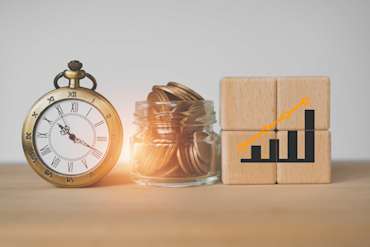
Late payments: Easing one of the biggest burdens on growing businesses
Simple, smart accounting software - no commitment, cancel anytime

TAX AND PENSIONS
Note that this piece is out of date and currently refers to previous financial years and will be updated for the 2025/26 tax year shortly.
Many business owners are familiar with but usually don’t look forward to filing Self Assessments. Ensuring you complete your self-employed or sole trader tax return ahead of the deadline can be stressful for many, but it doesn't have to be! Preparing early for Self Assessments can save a lot of time, effort, and stress.
Answer some quick questions and find out how ready you are for Self Assessment?
Find out how QuickBooks can help with your HMRC Self Assessment.
Intuit QuickBooks research* revealed the personal and business impacts of Self Assessment season on UK small businesses and sole traders Despite having up to 10 months' notice to file their Self Assessment tax return, our research found that nearly half (46%) of owners held off filing until 2 to 3 months before the deadline. In fact, our research found that a quarter (25%) of our survey respondents will filed in the last month!
To try and combat this taxing time and help those who are feeling unprepared, we looked into the benefits of preparing for Self Assessments early and provided a range of tips and advice.
For those new to Self Assessment, it is an HM Revenue and Customs (HMRC) system used to collect Income Tax. People who earn income from sources outside of employment, such as business profits, usually have to report this via a Self Assessment tax return.
According to HMRC, those required to submit Self Assessment tax returns for 2023/24 must meet the next deadline of 31st January 2025 to avoid facing the following late filing penalties. Please note that late payment penalties and potential interest can also be charged…
Missing the January 31st deadline triggers an automatic £100 fine.
Failing to file the Self Assessment within three months, by the end of April, results in a £10-per-day fine (for up to 90 days).
You’ll receive a £300 penalty (or 5% of the tax owed – whichever is greater) if you still haven’t filed after another 90 days.
If you don’t file within a year, you risk facing another £300 fine (or 5% of the tax owed – whichever is greater).
HMRC will issue additional penalties – including up to 100% of owed tax – if the tax authority suspects somebody is intentionally delaying the filing.
Our survey revealed that one in five small businesses have previously missed the deadline resulting in considerable fines. As well as both deadlines and fines contributing to stress, various other factors can add pressure during the Self Assessment season.
Is this your first time? Read our guide on how to do a Self Assessment.
The complexity, due to the various types of tax codes, systems, deductions, allowances, and various sources of income can become extremely overwhelming. Fines can also be charged for errors, so the fear of making a mistake adds to the pressure.
Completing and paying Self Assessments can be extremely time-consuming due to the need to gather a range of information and documents — it takes longer if you don’t prepare early and have the required documents ready.
Understandably, many business owners will have plenty of other concerns, which may feel more urgent than Self Assessment. This busyness is often why many won’t start their Self Assessment until the last minute, adding extra stress and time. As revealed above, our survey found that a quarter of small business owners will file in the last month. For those who haven’t filed a Self Assessment before, it can be overwhelming to know where to even begin, which may be why it’s delayed and rushed in deadline-month.
The Self Assessment process involves calculating how much your business owes or how much you may receive as a refund — this can bring anxiety, especially if you are struggling financially. This worry might cause you to delay filing your Self Assessment until the last minute and feel the need to rush the task.
Pauline Green, Head of Product Compliance & Programs at Intuit QuickBooks UK comments: “In most cases, the idea of filing your Self Assessment tax return is much worse than actually doing it. Our research shows that doing things differently can build confidence.”
There’s a wide range of benefits that come with preparing for Self Assessments early, including extra time to check files, save finances, avoid fines, enjoy the festive period, and much more.
You don’t have to submit your tax return straight away — you could spend extra time triple-checking that all the information and documents are correct. HMRC can charge a penalty for certain errors, such as submitting paperwork which misrepresents tax liability, which can happen if you don’t complete the process carefully.
Another benefit of preparing early is gaining extra time to save for any tax you might owe in case it’s more than anticipated — filing early doesn’t mean you have to pay early, you can wait until nearer the deadline if you wish. Around 72 hours after you’ve filed your tax return, within your HMRC account if you’ve filed one, you can view your final tax calculation in your account’s ‘view your calculation’ section. If you file early, you can see the figure sooner and avoid falling short without time to spare.
Often, people who leave their Self Assessment until later will face even more pressure as they must work to a tight deadline — heightening the risk of fines and their business being affected. For example, our survey found that 59% of respondents reported that the lead up to Self Assessment has impacted their business. Almost one in five (19%) have had to cut staffing hours due to a lack of time to train them, and the same number (a further 19%) had to turn away customers.
This annual tax cycle also affects entrepreneurial motivation, with 55% of UK business owners surveyed saying in the lead up to the deadline, their passion for running the business has suffered.
One in ten businesses have to work on Self Assessment during the Christmas holiday period, according to our survey. As the timeline spans from April to January, if people don’t prepare early or complete it before Christmas, this could turn the most wonderful time of the year into a stressful and worrisome period.
Pauline said: “73% of sole traders and small businesses said that in order to submit their tax return earlier, they’d need to understand how to prepare their documentation in bite-sized chunks. 76% also agreed that having an easy-to-use business tool where they can track details in an app would help.”
Below are some key ways to be prepared for Self Assessment…
It's important to register for Self Assessments as early as possible, as this process can take time. Out of peak times, it can take two weeks or so to complete this step, but during peak times such as January, when the HMRC customer service is at its busiest, it can take longer and increase the risk of missing the deadline.
The registration process has two stages — first, you’ll receive a unique taxpayer reference in the post or via email which is needed to register for HMRC online services. Then, a PIN is sent via post, which allows you to file. As well as HMRC getting busy during peak times, Royal Mail usually faces many delays over the festive season, which could delay the process even further as the PIN is only sent via post.
You can submit your Self Assessment anytime between the new tax year in April and the deadline — giving around nine months to organise all the required paperwork. Some of the information and records you will need include:
Unique Taxpayer Reference (UTR)
National Insurance Number
Any issued invoices
Salary and income from other jobs (found on your P60)
Dividends (found on bank statements or accounting records)
Allowable expenses (found in accounting records)
Keeping your records up-to-date and organised will make the process much easier. Preparing early will allow you to collect these documents as soon as possible, ensuring you have them ahead of Self Assessment.
Even scheduling an hour or so within your day to focus solely on your Self Assessment can help spread the process out and reduce stress while still ensuring you complete it in plenty of time.
To feel more prepared, stay up-to-date with your progress to confidently know if you are on track and aren’t missing anything. Self Assessment has many elements and steps, so a checklist is a useful first step to keep the process steady and ensure all aspects are complete.
As discussed, Self Assessment can be a stressful period, especially for first-timers. It can be confusing and difficult to understand what exactly is needed. Seeking guidance from a professional will ensure you are filling out the tax return accurately so you can confidently submit it.
A range of software is available to help with Self Assessment preparation — reducing stress and ensuring all aspects are counted for and done correctly. The QuickBooks Self Assessment tool helps users estimate how much income tax they owe, taking the guesswork out all year round. The tool also auto-calculates your figures and helps sort your expenses into categories.
As the deadline can be intimidating, the temptation to rush into completing and submitting the Self Assessment tax return is high, especially when running a business simultaneously. However, it’s crucial that you take your time with this process to prevent mistakes.
Pauline commented: “Starting early and being consistent is critical. With potentially tougher economic times ahead, using the tools and technology available will ultimately give UK business owners the confidence to spend their time on what they love doing - running and growing their businesses.”
If you are already well on your way to filing, this is an admirable place to be and leaves you ready for the January deadline. If you haven’t begun preparing yet, or are feeling the stress, we hope the above will help you prepare as soon as possible so you can hit the deadline and take some of the stress out of the process.
*Research conducted by Censuswide, with 1,257 Sole Traders / Small Business Owners & Directors (defined as businesses with less than 10 employees) in the UK between 16.11.2023 – 21.11.2023.
Micro-businesses have 0-9 employees. There were 5.2 million micro-businesses in the UK in 2022, accounting for 95% of all businesses.
The QuickBooks blog covers a wide range of business-related topics designed to help you grow and develop your business.
Subscribe to get our latest insights, promotions, and product releases straight to your inbox.
9.00am - 5.30pm Monday - Thursday
9.00am - 4.30pm Friday